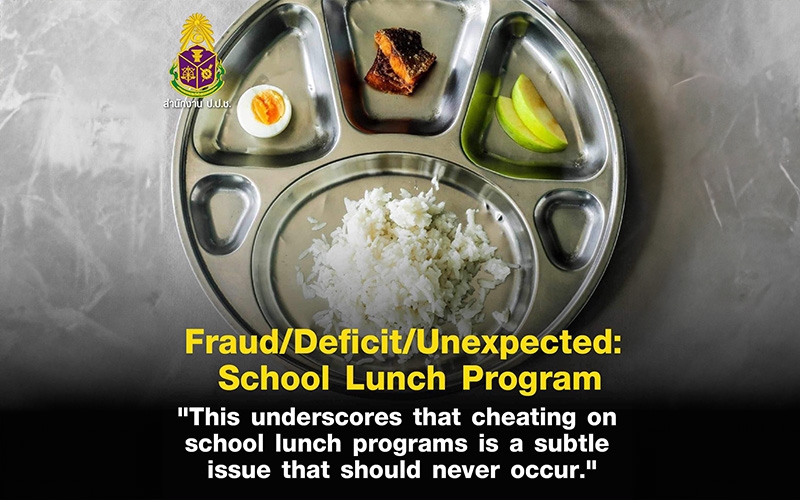Article
Fraud Deficit Unexpected School Lunch Program
โดย ดร.มานะ นิมิตรมงคล โพสเมื่อ Jul 08,2023

Repeated news stories reveal low-quality, insufficient school lunches for children. The problems stem from three main causes: fraudulent practices, budget deficits, and unforeseen incidents. These issues are further complicated by an interconnected system involving school administrators and local education areas, with mutual protection when problems arise.
The annual budget for lunch programs is 28.4 billion baht, targeted for 5.8 million students from grade 1 to 6. Persistent issues need resolution. It requires open communication and collaboration between teachers, communities, and related agencies to tackle the problem directly.
Fraud...
The main problem is the rampant corruption and nepotism. Instances of under-the-table transactions are carried out by school principals, meal-supervising teachers, or cooks. Such behavior includes hiring contractors, employing kitchen staff, purchasing insufficient or poor-quality ingredients, preparing insufficient or low-quality meals, opting for cheap, easy-to-make dishes regardless of dissatisfaction among teachers and students, etc.
Numerous cases exist where school principals break the law, justifying their actions by saying, "other schools are doing it too." For instance, they deduct a portion of the lunch money daily, claiming it's for hosting guests, organizing festivals, buying gifts for seniors, organizing sports events, distributing meals to high school students, etc. Even if they don't pocket the money themselves, such behavior is still misappropriation and misuse of government funds.
Sometimes, even when schools aren't providing lunch due to special holidays or event days, they still claim the full budget.
Budget Deficit...
Receiving insufficient budget isn't usually a problem for well-known, large schools. However, it poses a significant issue for small schools with fewer students. For example, a school with 20 students receives a daily food budget of 720 baht. After deducting transportation and gas costs, there's hardly anything left. Some large schools suspiciously demand 'extra money' from teachers and students, claiming it's for better quality and quantity meals. Some hire cooks but still use teacher and student labor.
The fact remains that urban and rural schools face different ingredient costs, transportation charges, and other expenses. Small schools, with limited teachers, face a greater burden.
Unexpected Incidents...
Often, 'unexpected incidents' create complications and conflicts. For instance, local administrative organizations may delay budget transfers. Issues can also arise from conflicts between teachers and project supervisors or between teachers and school committees. New project supervisors may lack knowledge about proper nutrition and meal preparation. Some teachers and staff eat children's meals without paying contributions.
Prevention Measures…
The problems affecting students cause hardships for well-intentioned school administrators and teachers. Preventive solutions should be implemented simultaneously, such as:
1. Raise awareness and involvement of parents and teachers by posting budget details on the school notice board or website. These should specify how much funding is allocated for each item for the academic term, how the funds have been used, who was paid, and at what price.
2. Address the budget deficit issue. For instance, local administrative organizations (LAO) with substantial revenues could allocate more funds for school lunches. Suppose the Cabinet resolution sets meal prices at 22-36 baht per head. In that case, the LAO could increase this to 32-46 baht or subsidize construction costs, transportation costs, kitchen staff wages, etc. Also, government regulations need to clarify what school meal funds can and cannot be used for.
3. To prevent delays in fund transfers to schools due to the need to verify actual student numbers, LAOs could use last year's student data or the number available when school enrollment ends. Usually, LAOs transfer meal funds directly to schools. In contrast, the Bangkok Metropolitan Administration (BMA) transfers through the Office of Basic Education Commission. In such cases, the BMA should act promptly and carefully.
4. Students and teachers can help monitor and expose any malpractices. The "WATCHDOG" Facebook page and cyber sleuths can help uncover issues, with social media and mass media spreading the news to the wider community.
5. The 'Thai School Lunch' program developed by the Ministry of Education and NECTEC can assist in planning balanced meals for students in the absence of a resident nutritionist.
6. The Anti-Corruption Organization of Thailand (ACT) has developed the 'ACT Ai Transparent School' program, which serves as a bridge between schools, administrators, students, parents, and communities. It helps everyone understand budget usage, management, problems, and the needs of all parties. This tool is expected to reduce potential conflicts in schools and communities in the future.
7. If there is a surplus from the school lunch funds, it should be up to the school committee to decide its usage, not just the sole discretion of the school director.
Conclusion…
The Corruption Court's verdict on the case of feeding students with noodles mixed with fish sauce concluded that 'Even though the calculated amount of money is not that much, this manipulation deprives students under their care of quality and sufficient midday meals for body development, which results in long-term harm. This incident is a serious matter and should not wait for punishment.'
This underscores that cheating on school lunch programs is a subtle issue that should never occur.
Dr. Mana Nimitmongkol
Secretary-General of the Anti-Corruption Organization of Thailand


